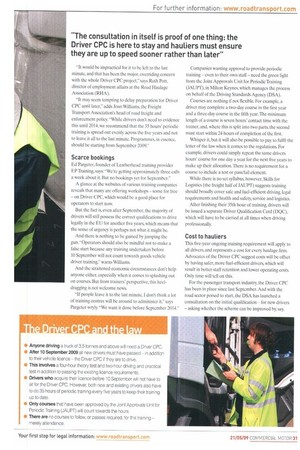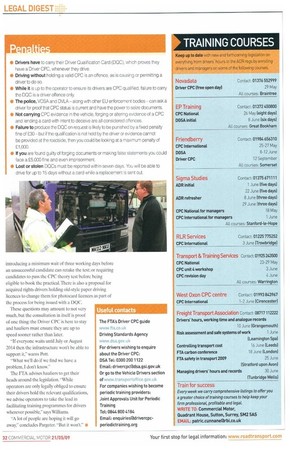EU directive 2003/59 comes into force on 10 September this
Page 30

Page 31

Page 32

If you've noticed an error in this article please click here to report it so we can fix it.
year. Sound familiar? No? Well, it should do. This is the legislation that introduces the Driver Certificate of Professional Competence (CPC).
A separate qualification from the transport manager's or operator's CPC (although training providers have reported a degree of confusion from worried hauliers on this), the Driver CPC —involving new practical and theory tests — will be required by anyone acquiring an HGV licence for categories C, Cl, Cl FE or C+E from September.
Drivers will also need to complete 35 hours' periodic training every five years. Although drivers with an existing vocational licence will have grandfather rights exempting them from the Driver CPC, they too will need to adhere to this training regime.
Trying to determine how alert the industry is to its new responsibilities is tricky. From no existing drivers have until September 2014 to complete the training. Perhaps unsurprisingly, companies seem to be biding their time. And there is the possibility that many could be prepared to bide it until summer 2014. "It would be impractical for it to be left to the last minute, and that has been the major, overriding concern with the whole Driver CPC project," says Ruth Pott, director of employment affairs at the Road Haulage Association (RHA).
"It may seem tempting to delay preparation for Driver CPC until later," adds Joan Williams, the Freight Transport Association's head of road freight and enforcement policy. "While drivers don't need to evidence this until 2014, we recommend that the 35 hours' periodic training is spread out evenly across the five years and not to leave it all to the last minute. Programmes, in essence, should be starting from September 2009."
Scarce bookings
Ed Pargcter, founder of Leatherhead training provider EP Training, says: "We're getting approximately three calls a week about it. But no bookings yet for September."
A glance at the websites of various training companies reveals that many are offering workshops — some for free — on Driver CPC, which would be a good place for operators to start now.
But the fact is, even after September, the majority of drivers will still possess the correct qualifications to drive legally in the EU for another five years, which means that the sense of urgency is perhaps not what it might be.
And there is nothing to be gained by jumping the gun. "Operators should also be mindful not to make a false start because any training undertaken before 10 September will not count towards goods vehicle driver training," warns Williams.
And the straitened economic circumstances don't help anyone either, especially when it comes to splashing out on courses. But from trainers' perspective, this heeldragging is not welcome news "If people leave it to the last minute. I don't think a lot of training centres will be around to administer it,says Pargeter wryly. "We want it done before September 2014." Companies wanting approval to provide periodic training — even to their own staff — need the green light from the Joint Approvals Unit for Periodic Training (JAUPT), in Milton Keynes, which manages the process on behalf of the Driving Standards Agency (DSA).
Courses are nothing if not flexible. For example, a driver may complete a two-day course in the first year and a three-day course in the fifth year. The minimum length of a course is seven hours' contact time with the trainer, and, where this is split into two parts, the second must start within 24 hours of completion of the first.
Whisper it, but it will also be possible to pay to fulfil the letter of the law when it comes to the regulations. For example, drivers could simply repeat the same drivers hours' course for one day a year for the next five years to make up their allocation. There is no requirement for a course to include a test or pass/fail element.
While there is no set syllabus, however, Skills for Logistics (the freight half of JAUPT) suggests training should broadly cover safe and fuel-efficient driving, legal requirements and health and safety, service and logistics.
After finishing their 35th hour of training, drivers will be issued a separate Driver Qualification Card (DQC), which will have to he carried at all times when driving professionally.
Cost to hauliers
This five-year ongoing training requirement will apply to all drivers, and represents a cost for every haulage firm. Advocates of the Driver CPC suggest costs will be offset by having safer, more fuel-efficient drivers, which will result in better staff retention and lower operating costs. Only time will tell on this.
For the passenger transport industry, the Driver CPC has been in place since last September. And with the road sector poised to start, the DSA has launched a consultation on the initial qualification — for new drivers — asking whether the scheme can be improved by, say. introducing a minimum wait of three working days before an unsuccessful candidate can retake the test; or requiring candidates to pass the CPC theory test before being eligible to book the practical.There is also a proposal for acquired rights drivers holding old-style paper driving licences to change them for photocard licences as part of the process for being issued with a DQC. These questions may amount to not very much, but the consultation in itself is proof of one thing: the Driver CPC is here to stay and hauliers must ensure they arc up to speed sooner rather than later.
-If everyone waits until July or August 2014 then the infrastructure won't be able to support it," warns Pott.
"What we'll do if we find we have a problem. I don't know."
The ETA advises hauliers to get their heads around the legislation. -While operators are only legally obliged to ensure their drivers hold the relevant qualifications, we advise operators to take the lead in facilitating training programmes for drivers wherever possible," says Williams.
"A lot of people are hoping it will go away," concludes Pargeter."But it won't." •
















































































































































